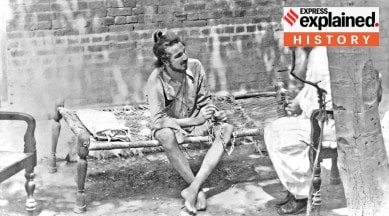How Nehru defended Bhagat Singh after his conviction: ‘This type of courage is rare’
Shaheed Diwas | Nehru had said, "Whether I agree with him or not, my heart is full of admiration for the courage and self-sacrifice of a man like Bhagat Singh. Courage of the Bhagat Singh type is exceedingly rare."

Bhagat Singh was hanged on March 23, 1931, which is now observed as Shaheed Diwas. Today, his revolutionary philosophy is often juxtaposed with Congress’s non-violence.
However, while Congress did choose the path of non-violence in its struggle for freedom, there were many younger leaders in Congress who not only sympathised with the idealism of Bhagat Singh’s convictions, but also his use of revolutionary violence.
Jawaharlal Nehru was one such figure. While he himself was a strong proponent of Gandhi’s ideas of non-violence, he admired Bhagat Singh’s bravery and understood his revolutionary methods.
Why was Bhagat Singh hanged?
On March 23, 1931, revolutionaries Bhagat Singh, Sukhdev Thapar and S Rajguru were hanged at 7.30 pm in the premises of the Lahore Jail. The trio had been convicted in what came to be known as the ‘Lahore Conspiracy Case’, for the murder of British police officer John Saunders in 1928.
The trial that convicted Bhagat Singh, Sukhdev and Rajguru was contentious. To speed the process, Viceroy Lord Irwin passed an ordinance to set up a special tribunal comprising three high court judges. This is seen by legal historians as an injustice as it abruptly, and for no legitimate reason, upended the due process of law to swiftly arrive at a judgement. Crucially, the only appeal after the tribunal was to the Privy Council – the highest court in the British Empire – located in England.
Despite petitions challenging Irwin’s ordinance as illegal, the trial went on. On October 7, 1930, the tribunal delivered a 300-page judgement and concluded that based on available evidence, Bhagat Singh, Sukhdev and Rajguru participated in Saunders’ murder.
They were sentenced to death by hanging, despite themselves requesting a shooting squad instead. Singh would write in one of his last letters, “I have been arrested while waging a war. For me there can be no gallows. Put me into the mouth of a cannon and blow me off.”
What did Nehru say about Bhagat Singh?
Jawaharlal Nehru angrily denounced the tribunal’s judgement, British academic Satvinder Singh Juss wrote in his book The Trial of Bhagat Singh. In a speech in Allahabad on October 12, 1930, he criticised not just the tribunal, but also the Viceroy and the British regime on a whole.
“If England were invaded by Germany or Russia, would Lord Irwin go about advising the people to refrain from violence against invaders? If he is not prepared to do that, let him not raise the issue. It is for Mahatma Gandhi and others, who believe with him, to do so … But let there be no mistake about it. Whether I agree with him or not, my heart is full of admiration for the courage and self-sacrifice of a man like Bhagat Singh. Courage of the Bhagat Singh type is exceedingly rare. If the Viceroy expects us to refrain from admiring this wonderful courage and high purpose behind it, he is mistaken. Let him ask his own heart what he would have felt if Bhagat Singh had been an Englishman and acted for England,” Jawaharlal Nehru told a large crowd that had gathered to hear him speak.
In his speech, Nehru did not only justify violence used by the revolutionaries by pretty much using the same arguments they themselves made, he openly stated his disagreement with friend and mentor, Mahatma Gandhi.
Did Nehru have sympathies for revolutionaries?
Nehru always sympathised with Indian revolutionaries even though he himself did not believe in or preach violence. His socialist background allowed him to understand the justifications for revolutionary violence and he repeatedly wrote about the courage of the revolutionaries.
While Gandhi often outrightly condemned revolutionary activities, Nehru saw revolutionaries fighting their own struggle and appreciated them for it. In 1929, he even met Bhagat Singh and fellow inmates at the Mianwali Jail, at a time when they were on a hunger strike demanding better treatment as ‘political prisoners’.
After the meeting, he would say, “I was very much pained to see the distress of the heroes. They have staked their lives in this struggle. They want that political prisoners be treated as political prisoners. I am quite hopeful that their sacrifice would be crowned with success.”
He would later write about this in his autobiography. “It was very painful for me to meet these extraordinarily brave young men and to see their manifest suffering. I gather from them that they would adhere to their resolve, whatever the consequences to their individual selves might be. Indeed, they didn’t care very much for their own selves,” Nehru wrote in admiration of the suffering.
After the hanging, in an annual Congress session, Nehru moved an official resolution, which was seconded by Madan Mohan Malviya. Despite Congress’s official position decrying any violence, the resolution condemned the execution. It read, “This Congress is of the opinion that this triple execution is an act of wanton vengeance and is a deliberate flouting of the unanimous demand of the nation for commutation”.